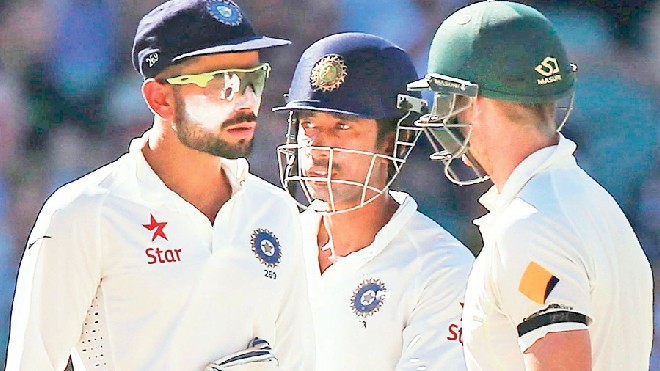
Laws of cricket are changing regularly, every six months or at the most a year. The gurus of the game aim to simplify them but they end up making them more complicated

Laws of cricket are changing regularly, every six months or at the most a year. The gurus of the game aim to simplify them but they end up making them more complicated.
Even some international cricketers don’t fully understand some of these laws. Australia’s Peter Handscomb has said he was "unaware" of DRS (Umpire Decision Review System) when the spat between Aussie skipper Steven Smith and his counterpart Virat Kohli happened during their second Test at Bangalore, which Smith later described as "brain fade".
I understand that the moment was crucial for both the teams and the reaction was natural, but later on Kohli came to media and accused Smith of "cheating" in the usage of DRS, flared up the tension on both sides and even made waves in international cricket. The point is that the gurus are mum on this matter. We didn’t hear a single voice from International Cricket Council (ICC) and that’s what surprised me.
Faf du Plessis, the South Africa captain, was surprised too. "I was, yes. Purely from the reason of what I went through in Australia for something I feel was a lot smaller, so (am) surprised with it," he said, and yes, he was right because ICC screamed at him when he rubbed his saliva on the ball while chewing a mint gum. Du Plessis has always denied ball tampering.
So is it true that ICC has different measures for different teams (boards) and if it’s not true then why did the council let the matter go without any fine, or even a warning?
What I concluded from all the drama is that ICC itself isn’t aware of its half-baked rules, which they discuss on the coffee table and impose on the game the next day without giving it a thought.
DRS was introduced in 2008 during India’s tour to Sri Lanka but Board of Control for Cricket in India (BCCI) continued to reject this idea for a long time.
On the other hand ICC was constantly reshaping the rule. It was so frequent that Sri Lanka’s Mahela Jayawardene blurted last year that "we sat in the cricket committee last week and we decided that the 50 percent of this rule should be reduced to 25 percent. Now you are the judge to decide how committee of ex-cricketers just "sit down" and "decide" that how they "feel" it’s the right thing to do -- that’s how these rules are being created -- on a cuppa tea.
ICC is an international council working for the greater good of the game and should act accordingly. It is instead acting like a private club.
After the recent spat between Kohli and Smith, signalling at the dressing room for help on DRS has become a big issue. One way to resolve this is to give the players less time, say only five seconds to decide whether they want a review or not.
The batsman always knows if he has hit the ball, the non-striker can give a quick signal on where he thinks the ball pitched and where he thinks it is headed and a decision can be made whether or not to go for the review. Or to make things even simpler, we can even consider the option of not restricting dressing room signals at all as long as the player’s teammates in the dressing room haven’t seen a replay.
Anything can go in the game, but if you are a cat that goes only after who is feeding, that’s not sports, it is called the "pet-shop" dilemma.